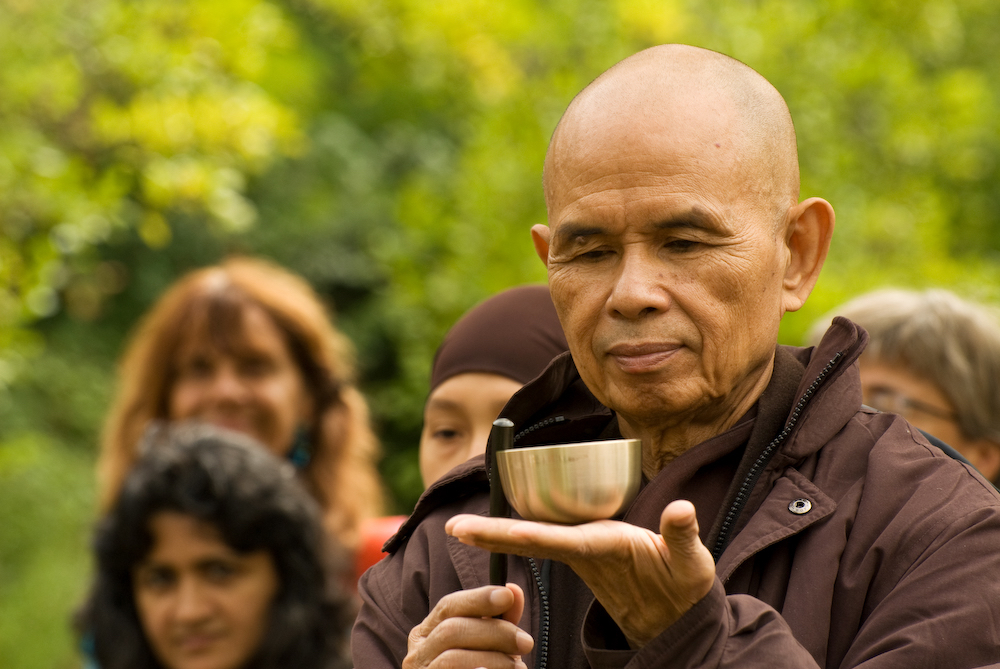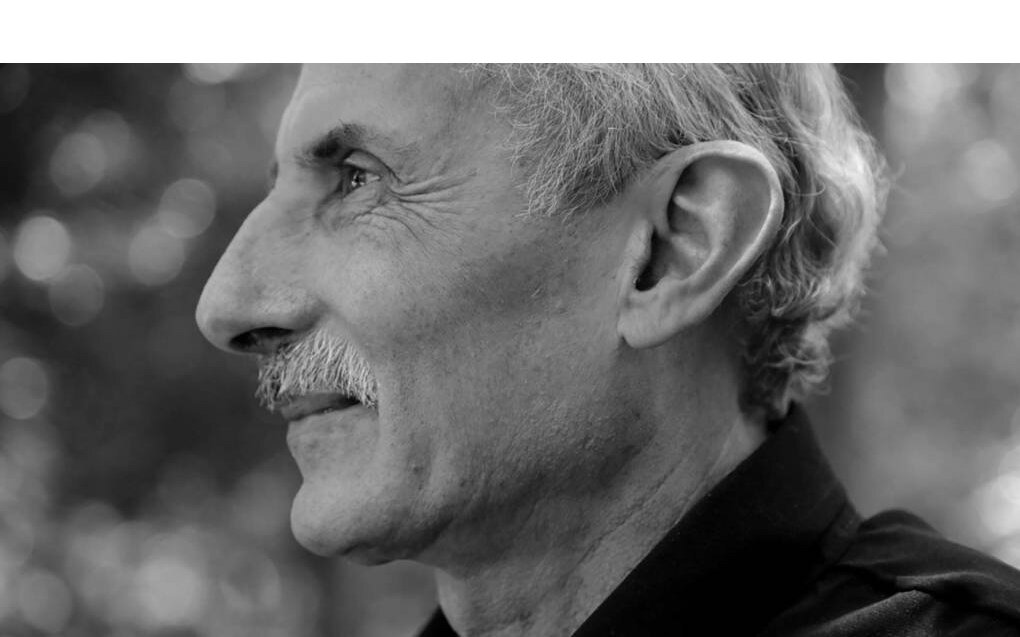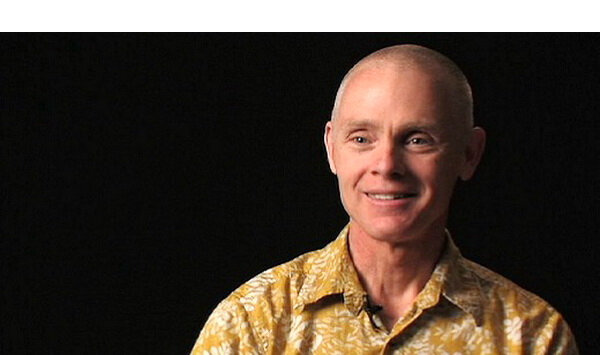
“What, in God’s Name, is Christ Consciousness?” (Part 2) by Seán ÓLaoire
Jesus told many parables whose purpose, I believe, was to help the listeners differentiate between the ego and the soul. For example, he tells of a rich man who, before he went away on a long trip, set a manager in charge of his property and workers. The rich man delayed in coming back, so the manager figured he had gotten lost or had died. So, he began to regard the property and the workers as his own – and started to get drunk and abuse them. How to interpret this? I don’t think that the rich man was God and that the manager represented the typical sinful human, whom God would punish. Rather, I believe, that the rich man represents the soul and the manager represents the ego. Very often, we mistake our egos for our souls and neglect our incarnational missions.
SUPPORT SEAN O’LAOIRE’S GOOD WORK AND PATHEOS.COM

“The Life Story of Thich Nhat Hanh” presented by Plum Village
Zen Master Thich Nhat Hanh is a global spiritual leader, poet, and peace activist, renowned for his powerful teachings and bestselling writings on mindfulness and peace. A gentle, humble monk, Dr. Martin Luther King, Jr. called him “an Apostle of peace and nonviolence” when nominating him for the Nobel Peace Prize. Exiled from his native Vietnam for almost four decades, Thich Nhat Hanh has been a pioneer bringing Buddhism and mindfulness to the West, and establishing an engaged Buddhist community for the 21st Century.

“Lecture on Zen” by ALAN WATTS (transcribed by Alan Seaver)
Once upon a time, there was a Zen student who quoted an old Buddhist poem to his teacher, which says:The voices of torrents are from one great tongue, the lions of the hills are the pure body of Buddha. 'Isn't that right?' he said to the teacher. 'It is,' said the teacher, 'but it's a pity to say so.'It would be, of course, much better, if this occasion were celebrated with no talk at all, and if I addressed you in the manner of the ancient teachers of Zen, I should hit the microphone with my fan and leave. But I somehow have the feeling that since you have contributed to the support of the Zen Center, in expectation of learning something, a few words should be said, even though I warn you, that by explaining these things to you, I shall subject you to a very serious hoax.
If I allow you to leave here this evening, under the impression that you understand something about Zen, you will have missed the point entirely. Because Zen is a way of life, a state of being, that is not possible to embrace in any concept whatsoever, so that any concepts, any ideas, any words that I shall put across to you this evening will have as their object, showing you the limitations of words and of thinking.

“On Received, Intellectual and Experiential Wisdom” (Course One) by Renee Chen
Interwoven with an exploration of denial, ignorance and naïveté — a cross-examination of Buddhist teachings and psychodynamic theory
Opening Thoughts
I’ve been pondering a lot about the differences between denial, ignorance and naiveté, and how media popularization of the term “woke” in the last couple of years has, at least for me, undermined and downplayed my understanding and desire to understand some very complex, urgent and critical issues.

“Opening the Door of Your Heart" (excerpt from) WHO ORDERED THE TRUCKLOAD OF DUNG? by Ajahn Brahm
SEVERAL CENTURIES AGO, seven monks were in a cave in a jungle somewhere in Asia, meditating on the type of unconditional love I described in the previous story. There was the head monk, his brother, and his best friend. The fourth was the head monk’s enemy: they just could not get along. The fifth monk in the group was a very old monk, so advanced in years that he was expected to die at any time. The sixth monk was sick—so ill in fact that he too could die at any time. And the last monk, the seventh, was the useless monk. He always snored when he was supposed to be meditating; he couldn’t remember his chanting, and if he did he would chant off-key He couldn’t even keep his robes on properly. But the others tolerated him and thanked him for teaching them patience.
BE A SUPPORTER OF AJAHN BRAHM’S WORK

“Why Buddhism and the West Need Each Other: On the Interdependence of Personal and Social Transformation” by David Loy
The mercy of the West has been social revolution. The mercy of the East has been individual insight into the basic self/void. We need both.
~Gary Snyder
Another way to put it: the highest ideal of the Western tradition has been the concern to restructure our societies so that they are more socially just. The most important goal for Buddhism is to awaken and (to use the Zen phrase) realize one’s true nature, which puts an end to dukkha—especially that associated with the delusion of a separate self. To- day it has become more obvious that we need both: not just because these ideals complement each other, but also because each project needs the other.
BE A SUPPORTER OF THE HUFFINGTON POST AND DAVID LOY

"Why Doesn’t Asia Have Religion?" by Thomas David DuBois
Having spent the past 10 years writing and teaching on Asian religions, I now have something to confess:
Asia does not have religion.
“But what,” you may ask, “about that college class I took on ‘world religions?’ We learned about Hinduism, Confucianism, Daoism (Taoism) and Shinto. Half the class was about Asia.”
Between you and me, I hate that class. I hated it as a student, because I thought it didn’t make sense. I hate it even more as a professor, because I know it doesn’t make sense. Here’s why.
BE A SUPPORER OF THE HUFFINGTON POST AND THE WORK OF THOMAS DAVID DUBOIS

"The Self-Hatred Within Us" by Sharon Salzberg
I often think about a memorable conversation I had with His Holiness the Dalai Lama in 1990 while we were at a small conference in India sponsored by the Mind & Life Institute. At one point during the event, I had an opportunity to ask the Dalai Lama a question, so I ventured,
“Your Holiness, what do you think about self-hatred?”
He looked at me seeming somewhat confused and asked in response: “What’s that?”
BE A SUPPORTER OF HIS HOLINESS AND THE WORK OF MS. SALZBERG

Are Humans Special? by David Loy
Obviously we are a unique species. Just look around: humans have transformed much of the surface of the earth, remolding it for our own convenience. We have fulfilled God’s injunction in the first chapter of the Bible: “Let us make man in our image, in our likeness, and let them rule over the fish of the sea and the birds of the air, over the livestock, over all the earth, and over all the creatures that move along the ground.” (Genesis 1:26) A few chapters later our dominion is reiterated: “And fear of you and the dread of you shall be upon every beast of the earth, and upon every fowl of the air . . . into your hands they are delivered.” (9:2) We may wonder what it means to be made in God’s image (more on that later), but our superiority to all other creatures is thereby divinely sanctioned, with the apparent implication that they exist for us to use.
BE A SUPPORTER OF TIKKUN AND DAVID LOY

"Living and Dying with Dignity: A Buddhist View" by Dr. Yoichi Kawada
In supporting people as they make difficult ethical decisions, Buddhism does not offer a set of fixed rules. In the case of medical-related decisions, such rules could be rendered outmoded or meaningless by further technological advances. Rather, it seeks to enable people to develop a deeper and clearer understanding of the nature of their own lives and the lives of others as a basis for such decisions. Specifically, it seeks to help people develop the wisdom and compassion that will enable them to experience a lasting sense of satisfaction and happiness. In this sense, Buddhist “precepts” are best understood as an internalized ethic of compassion that guides us toward becoming active, contributing participants in the creative evolution of the universe.
PLEASE SUPPORT DR. KAWADA’S WORK

"If There is No Self, Then Who’s Sitting Here?" by Sunada Takagi
Does the Buddhist idea of “no self” strike you as bizarre or outrageous? Sunada has been reflecting on this difficult concept, and shares her thoughts on it so far. It isn’t just an obscure philosophical point for mental gymnasts, she says. Paradoxically, she thinks the ideas can help us in a very real way toward finding and becoming more of who we really are.
If I asked you who you are, what would you say? Many people might begin by telling me what they do for work – teacher, software engineer, accountant. But no, I’d say. That’s the work you do, not who you are. If you changed or lost your job, that identity would disappear. So who are you really?
SUPPORT MS. TAKAGI’S EXCELLENT WORK

"Buddha Nature" by Sharon Salzberg (from rebel buddha website)
When asked about self hatred the Dalai Lama said, "Self hatred. What is that? But you have Buddha nature. How could you think of yourself that way?" How can Western Buddhists gain confidence in Buddha nature and nourish our capacity to offer lovingkindness to ourselves?
VISIT MS. SALZBERG’S WORK

"Awakening to Delusion" by Joseph Bobrow Roshi
Why do we suffer?
Why do we cause others to suffer?
What can we do about it?
Why do we suffer? From a Buddhist perspective, it is due to greed, hatred and delusion, the three poisons. These create suffering, these are our suffering. But we need to add a word to the Buddhist formula: unbridled. It is unbridled greed, hatred, and delusion that amp up suffering exponentially. The secret sauce in this toxic mix is self-deception. The road to hell is paved with…
BE A SUPPORTER OF JOSEPH BOBROW ROSHI’S WORK

"Compassion and the Individual" Tenzin Gyatso: The Fourteenth Dalai Lama
The purpose of life
ONE GREAT QUESTION underlies our experience, whether we think about it consciously or not: What is the purpose of life? I have considered this question and would like to share my thoughts in the hope that they may be of direct, practical benefit to those who read them.
I believe that the purpose of life is to be happy. From the moment of birth, every human being wants happiness and does not want suffering. Neither social conditioning nor education nor ideology affect this. From the very core of our being, we simply desire contentment. I don't know whether the universe, with its countless galaxies, stars and planets, has a deeper meaning or not, but at the very least, it is clear that we humans who live on this earth face the task of making a happy life for ourselves. Therefore, it is important to discover what will bring about the greatest degree of happiness.
BE A SUPPORTER OF HIS HOLINESS AND WORLDWIDE COMPASSION…

"Bringing Home the Dharma: Awakening Right Where You Are" by Jack Kornfield
RAIN is a useful acronym for the four key principles of mindful transformation of difficulties. RAIN stands for Recognition, Acceptance, Investigation, and Nonidentification. A line from Zen poetry reminds us, “the rain falls equally on all things.” Like the nourishment of outer rain, the inner principles of RAIN can be applied to all our experience, and can transform our difficulties.
BE A SUPPORTER OF MR. KORNFIELD’S WORK

"Are You Ready to Lose Your World?"by Adyashanti
There is a very famous poem written by the third patriarch of Zen, Seng-ts’an, called the Hsin-Hsin Ming, which translates as Verses in Faith Mind. In this poem Seng-ts’an writes these lines: “Do not seek the truth; only cease to cherish opinions.” This is a reversal of the way most people go about trying to realize absolute truth. Most people seek truth, but Seng-ts’an is saying not to seek truth. This sounds very strange indeed. How will you find truth if you don’t seek it? How will you find happiness if you do not seek it? How will you find God if you do not seek God? Everyone seems to be seeking something. In spirituality seeking is highly honored and respected, and here comes Seng-ts’an saying not to seek.
BE A SUPPORTER OF ADYA’S WORK

"The Beauty of Beginner’s Mind" by Jack Kornfield
The wisdom of uncertainty frees us from what Buddhist psychology calls the thicket of views and opinions. “Seeing misery in those who cling to views, a wise person should not adopt any of them. A wise person does not by opinions become arrogant. How could anyone bother those who are free, who do not grasp at any views? But those who grasp after views and opinions wander about the world annoying people.” I like to think that the Buddha said this last sentence with a laugh. Ajahn Chah used to shake his head and smile, “You have so many opinions. And you suffer so much from them. Why not let them go?”
BE A SUPPORTER OF MR. KORNFIELD’S WORK

The Bodhisattva’s Path by Jack Kornfield
Bodhisattva is the Sanskrit word for a being who is devoted to awakening and to acting for the benefit of all that lives. The way of the bodhisattva is one of the most radical and powerful of all Buddhist forms of practice. It is radical because it states that the deep fulfillment of happiness comes from serving the welfare of others as well as ourself. Our highest happiness is connected with the wellbeing of others.
BE A SUPPORTER OF MR. KORNFIELD’S WORK

